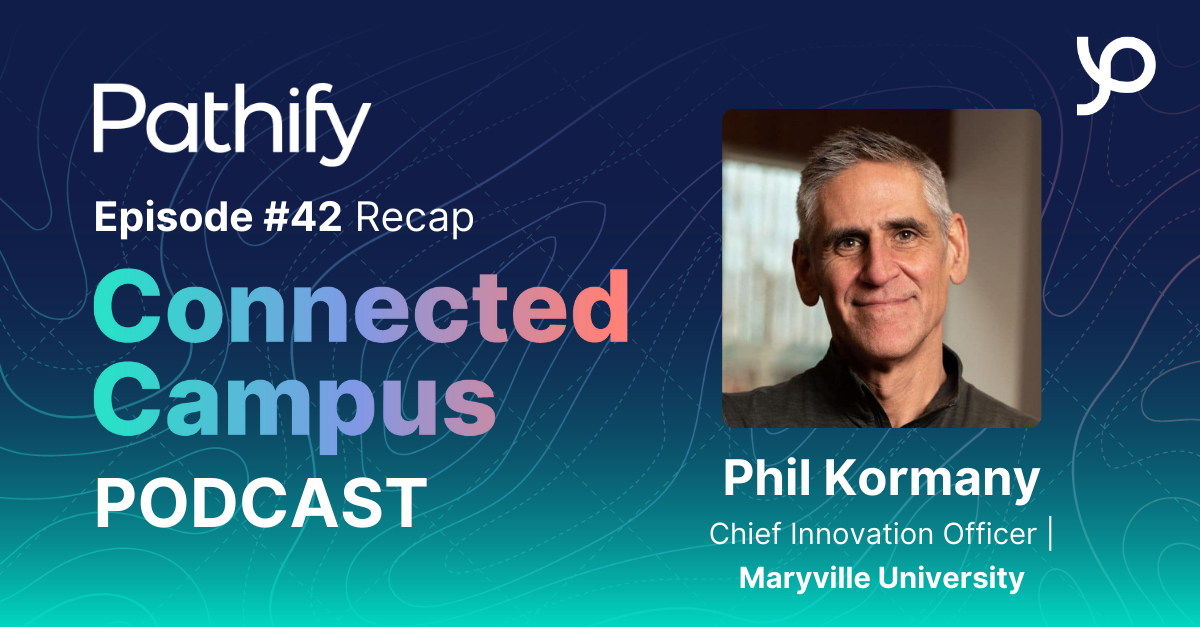We get the immense privilege of featuring amazing guests on our podcast, Connected Campus. We speak with, learn from, brainstorm and share ideas with the folks leading higher education forward toward its digital future — and from time to time, we like reflecting on recent conversations and highlighting key takeaways.
We recently had the pleasure of speaking with Phil Kormany, Chief Innovation Officer at Maryville University, about his perspective on digital transformation and how his institution continues as a trailblazing leader in the space.
(Compassionately) Navigating Digital Terrain
Higher ed’s digital transformation is complex – from digitizing information to providing students with self-service capabilities to automating departmental workflows – to name a few. According to Ravishanker, ensuring that the entire community – including faculty, staff, and students – is prepared for change is paramount. His advice? It’s not just about implementing new or updated technology; it’s about aligning initiatives with core campus culture and the diverse needs of departments, all while balancing budgets and ensuring compliance.
Embracing the Digital Learner Experience
Phil recalls Maryville’s transition from traditional IT department structures to a “Digital Learner Experience” team as encouraging a collective approach, leveraging data and fostering innovation in creating a high-quality student experience. He encourages higher ed leaders to consider adopting a similar model, promoting collaboration and accessible data for improved decision-making.
“It’s not about controlling through IT but empowering everyone through data. This shift has changed how we operate and deliver innovation,” Phil said.
Maryville’s digital strategy focuses on empowering users through data. Higher education institutions should draw inspiration from this approach, developing data-driven strategies to drive personalized student experiences f and make informed decisions on best ways to support them. Phil shares his visionary stance on reimagining IT departments within universities, emphasizing a shift towards a more integrated and collaborative model centering on the digital learner experience.
Phil continued to say, “Digital transformation isn’t about the technology itself, but how we apply it to solve real problems in education. It’s about people and how tech applies to people.”
Adopt an API-First Strategy
Phil also shares the importance of an API-first approach to technology adoption, emphasizing the significance of data integration and accessibility. He believes institutions should prioritize technologies offering robust APIs — promoting seamless data flow and integration — in enhancing digital infrastructure and facilitating better data management and analysis.
Phil’s sentiments resonate with Pathify. Our Engagement Hub unifies tech stacks and consolidates systems — providing a cohesive, modern digital student experience. This work is important because the tech stack of any institution only ever expands and requires an integrated approach.
Leverage AI for Personalized Learning and Support
Phil discusses the potential of Artificial Intelligence (AI) in creating personalized learning experiences and offering students support through chatbots and other automated tools. Using AI, educational institutions should provide customized learning paths, academic support and engagement opportunities, ultimately improving student success and learning outcomes through responsive, always on availability.
While AI is a relatively new tool in the higher education space, understanding its potential and integrating it thoughtfully into institutional strategies is crucial to staying ahead of digital transformation.
—
This episode sheds light on the transformative impact of technology in higher education and provides a blueprint for institutions aiming to effectively navigate the digital age. Phil’s visionary approach at Maryville University demonstrates how embracing change, prioritizing data and leveraging AI enhances the educational experience, making it more engaging, effective and inclusive. While many institutions may need to work hard to reach these milestones, Phil’s perspective serves as valuable guidance for IT teams as they chart their future course.
